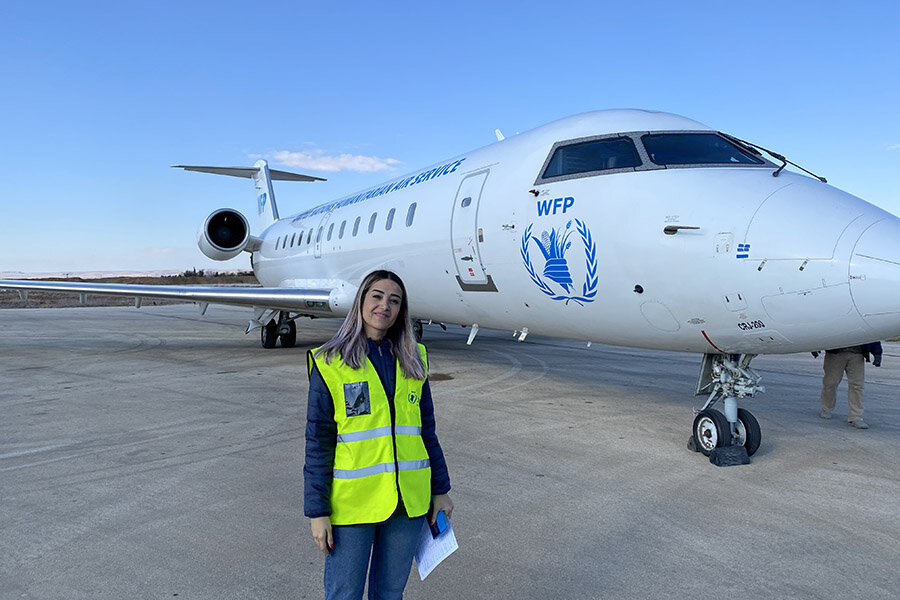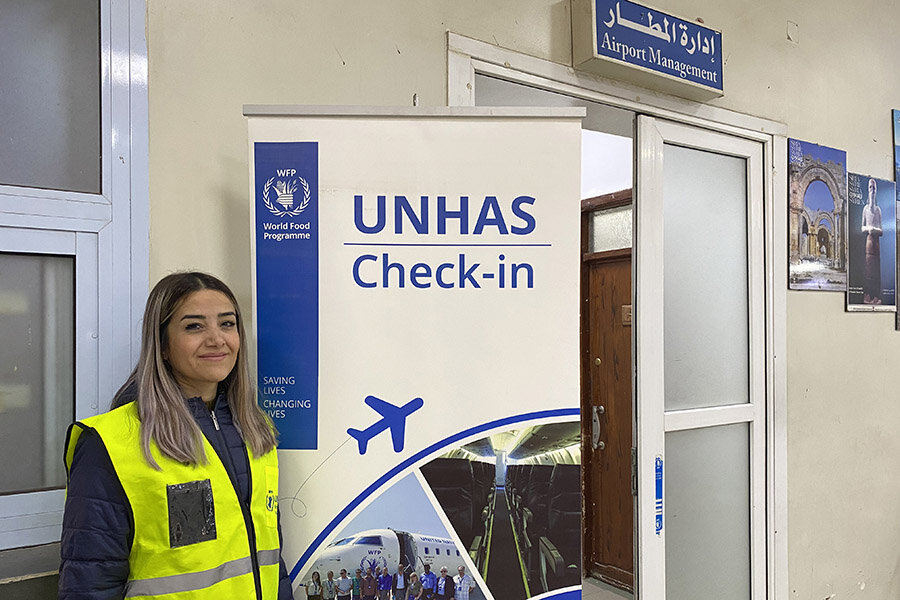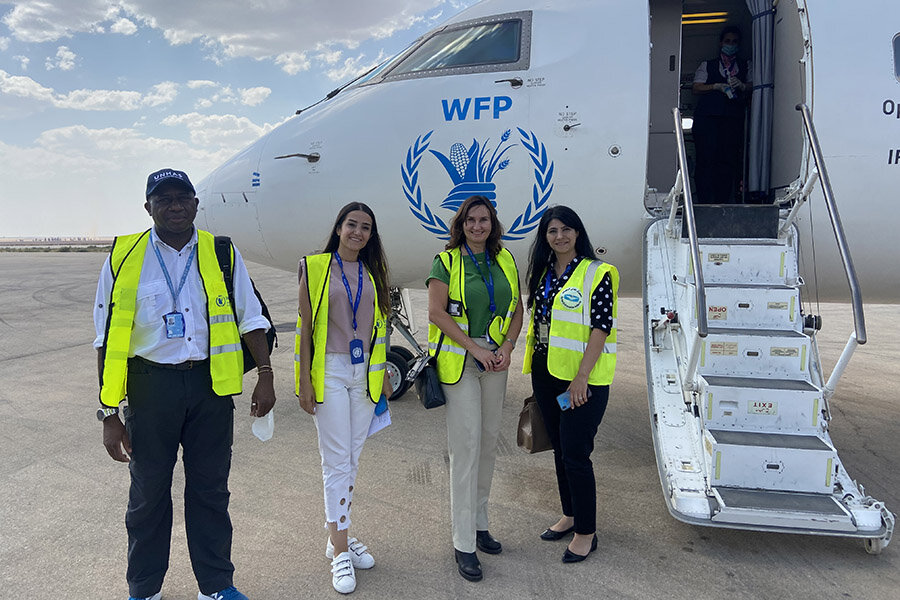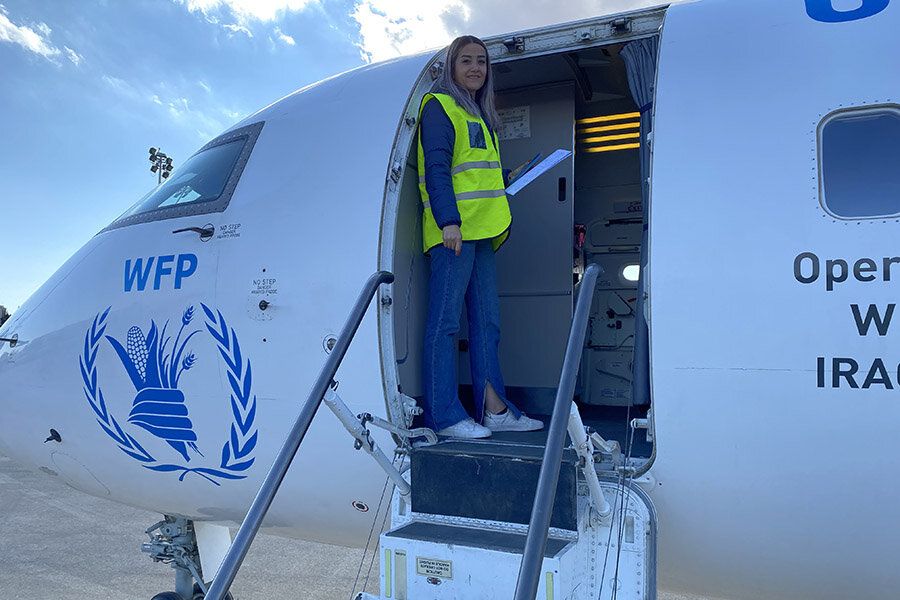Each day ‘a new adventure’ for UN humanitarian air service worker

It’s a Wednesday afternoon and Rasha has just finished closing the day’s flights between Damascus and her home city of Qamishli in Syria. For the second time this week she has helped humanitarian staff to check in, board and fly safely between the capital and the country’s north.
Rasha joined WFP’s team in Syria in early 2021 as an Aviation Assistant for the WFP-run United Nations Humanitarian Air Service (UNHAS) at Qamishli airport in Syria’s northeast. Prior to that, she’d worked in commercial aviation for seven years.
“Although I’ve been around aircrafts for so long, I still get this heart flutter every time I watch an aircraft take to the skies,” says Rasha. “It never gets ordinary being here. Every day is a new adventure for me.”
Rasha’s passion for airports goes back to childhood days. “My mother served at the same airport for 35 years. I vividly remember her wearing her silver uniform with a white blouse and a silky maroon scarf neatly tied around her neck.”
But what fascinated Rasha the most was her mother's devotion. “Qamishli is not a luxurious airport as it lacks comfort and catering facilities, so it can be rough to miss your flight and have to spend the night here. My mother assisted everyone she encountered unconditionally and to the best she could, and I wanted to be her one day.”

As conflict lines shifted dramatically over the years of crisis in Syria, the roads linking Damascus to the two northern governorates of Qamishli and Aleppo were difficult. Air became the most viable way for UN staff and humanitarian workers to travel between Damascus and the country’s north. With domestic airlines further disrupted by COVID19, the launch of UNHAS in Syria in July 2020 was a crucial link between staff, the people we serve and families.
What is now a one-hour flight used to be a 16-hour drive. “If it wasn’t for UNHAS, humanitarian staff would have faced many challenges in accessing families in need,” says Rasha.
Today, UNHAS in Syria serves 39 humanitarian organizations including UN agencies. Even with COVID-19 precautions strictly followed, the airline service transports an average of 350 passengers between Damascus, Aleppo and Qamishli.
In 2021, the humanitarian needs across Syria reached unprecedented levels. It’s more important than ever that staff can rapidly and safely reach those who are in urgent need of assistance.

At first, Rasha was most impressed by the airline’s high standards, discipline and punctuality, but then she found a deeper meaning to it.
“One day, my passengers were all onboard for a flight to Damascus and we were about to close the gate when a man from another humanitarian organisation rushed in with his daughter who was in need of urgent medical evacuation to Damascus,” she says. When Rasha contacted UNHAS management, she was immediately advised to delay the flight until the man had finalized his necessary documents.
“My supervisor told me: ‘Our existence is to serve these people, so our gates can’t be shut before them.’ That was the moment when I realized the humanitarian core of my work and it deeply moved me.”

UNHAS doesn’t just fly people, but lifesaving medical assistance, too. In 2021 the airline transported critical medical equipment, including mobility aids for people with disabilities and COVID-19 vaccines.
“It was thanks to UNHAS that UN staff in Qamishli and their dependents were vaccinated, as the vaccines and specialized medical staff had to be transported all the way from Damascus.”
Rasha knows that her job will be more challenging for months to come and with the onset of winter, but she can see the impact of her work each day as colleagues and families are now closer together than ever before.
UNHAS’s continual operation in Syria is made possible thanks to generous support from the European Union and EU citizens.
